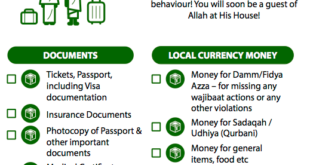Contributed by Professor David Kerr MD (Founder VoyageMD.com)
Depending on when the Hajj falls on the lunar calendar, some of the Hajj rituals need to be undertaken in extreme heat with temperatures often more than 45o C. The risks are heat stroke and dehydration, which can be aggravated by excessive exertion and basic sanitation. Other health risks relate to outbreaks of communicable disease from airborne agents or inadequately prepared food. As well as the general risks of any traveller attending a mass gathering such as the Hajj, there are additional health risks for travellers with diabetes.
General Measures to Reduce Health Risks at the Hajj

1) The quadrivalent meningococcal A, C, Y and W-135 vaccine is a mandatory requirement for a visa of the Hajj. Other vaccine requirements include yellow fever and polio for travellers from endemic areas. It is also suggested that that influenza, hepatitis A and B are up to date. Although pneumococcal vaccination makes sense there are no data yet to support its recommendation for pilgrims and typhoid vaccine is not currently indicated for pilgrims to Saudi Arabia.
2) All individuals considering travelling for the Hajj should consult with their medical practitioners well in advance and if possible try to improve physical fitness. It is important to note that medical exemptions are acceptable and for some a postponement of Hajj may be required. It may also be appropriate to for some to postpone Hajj until it falls at a period associated with less extreme weather.
3) Shaving the head is a ritual marking the end of the Hajj. All pilgrims are advised to use designated barbers and to make sure that a new blade is used. Using an unlicensed barber or a multi use blade can significantly increase the risk of serious skin and blood borne infections.
4) Other practical suggestions include:
- – Making sure adequate supplies of medicines are taken
- – Carrying Loperamide and maintaining hand hygiene
- – Taking a thermometer and first aid kit
- – Using sunscreen, seeking shade and if possible performing some rituals in the evening
- – Using a facemask and take a folding umbrella
- – Wearing a medical identification bracelet
Diabetes and the Hajj
5) As well as the general risks of any traveller attending a mass gathering such as the Hajj, there are additional health risks for travellers with diabetes related to
- – The journey to and from Hajj
- – The effect of the extreme environment and the ability to maintain safe and acceptable control of blood glucose levels
- – The effect of the extreme environment of pre-existing diabetes complications
Those who are travelling by Air can get the detail information on the timing of blood glucose testing and insulin injections for the flight. On VoyageMD.com travellers simply need to enter their departure airport, the date and time of departure and the “Flight Calculator” will provide detailed information on the timing of blood glucose testing and insulin injections for the journey. There is also information for people with diabetes using an insulin pump. The code for Jeddah airport is JED and the time is 2 hours ahead of GMT.
Diabetes and the Heat
6) Heat remains the number one weather related problem for people living with long-term medical conditions. There is also some medical evidence that people with diabetes have increased susceptibility to the heat and more often require visits to hospital emergency departments during heat waves.
7) One additional concern is the potential for severe dehydration when high temperatures are combined with high blood glucose levels. At the opposite end of the glucose spectrum, an individual’s usually warning symptoms of a low blood glucose level may be less reliable as some symptoms can also be cause by excessive heat. Frequent monitoring of blood glucose levels is therefore very important.
8) One very important factor is making sure diabetes monitoring equipment, insulin and other medications are kept at an appropriate temperature:
- – Blood glucose monitoring strips and meters should be kept at “average” room temperature, which is around 25°C/77°F.
- – All insulin needs to be kept at temperatures lower than 25°C/77°F. Insulin being used should be kept between 4°C and 24°C for a maximum of 28 days. Therefore, any insulin not currently using should be stored in a fridge at around 4°C but not frozen or near the freezer compartment.
- – These rules apply for most other injectable diabetes treatments such as Byetta and Victoza.
- – All travellers with diabetes should be trained in how to cope in the event of an intercurrent illness (sick-day-rules are also available on VoyageMD.com) and make sure they know how to access local health care at the Hajj. The Kingdom of Saudi Arabia has an advanced healthcare system with 141 primary medical clinics and 24 hospitals in the immediate vicinity of the Hajj well staffed with nurses and doctors.
- – It is always useful if before travel, an individual’s doctor can provide the traveller with a brief diagnostic summary with prescription details in a document small enough to fit into a pilgrim’s wallet.
9) Pilgrims need to check what strength of insulin they normally use as some countries provide insulin at 40 U/ml but in Saudi Arabia it is the more common 100 U/ml strength. If in doubt check with your diabetes team before travelling.
10) During the day the desert sand invariably becomes burning hot and therefore walking barefoot should be avoided when at all possible. The presence of loss of pain sensation affecting the feet (neuropathy) due to diabetes is particularly hazardous as the feet can be severely burnt without the individual being aware leading to a high risk of serious infection. During prayers, shoes are removed and given the huge numbers of pilgrims, loss of foot ware is not uncommon. Being forced to walk barefoot after losing shoes can be disastrous for anyone even in the absence of neuropathy.
Post Disclaimer | Support Us
Support Us
The sailanmuslim.com web site entirely supported by individual donors and well wishers. If you regularly visit this site and wish to show your appreciation, or if you wish to see further development of sailanmuslim.com, please donate us
IMPORTANT : All content hosted on sailanmuslim.com is solely for non-commercial purposes and with the permission of original copyright holders. Any other use of the hosted content, such as for financial gain, requires express approval from the copyright owners.
 Sri lanka Muslims Web Portal Sri Lanka Muslims News Center
Sri lanka Muslims Web Portal Sri Lanka Muslims News Center
 Donate
Donate


